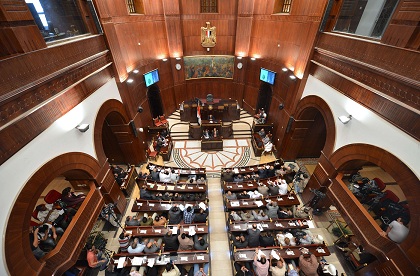Egypt’s National Dialogue kicked off on Tuesday with a meeting of its Board of Trustees. The board members agreed on the importance of the dialogue as a step towards creating a modern, civil, and democratic state.
Egypt’s National Dialogue aims to restore the June 30 alliance, said Diaa Rashwan, General Coordinator of the dialogue.
“Today, the National Dialogue officially starts. It is a conclusive dialogue. It aims to set the priorities for the Egyptian state,” he added.
The dialogue sessions schedule is expected to be announced in a press conference following the meeting.

“To be blunt, the Egyptian public opinion does not want more talk, they require legislation and actions to be taken and felt by the people,” he stressed
The board members called for the release of all political prisoners.
Head of the National Dialogue’s Technical Secretariat Mahmoud Fawzy said that the National Training Academy (NTA) has received 96,532 applications.
Fawzy indicated that the recommendations received from the dialogue participants were divided into three main pillars, political, social, and economic.
MP Ahmed El-Sharkawy, a member of the Board of Trustees called for full autonomy of the board to decide the schedule, points, and pillars of the dialogue, “without any intervention from the NTA.”
Board members include Head of Al-Ahram Centre for Political and Strategic Studies (ACPSS) Mohamed Fayez Farahat, Deputy Head of the ACPSS Amr Hashem Rabie, and Editor-in-Chief of Al-Ahram Al-Arabi weekly magazine Gamal El-Keshki.

President of the National Council for Women (NCW) Maya Morsy and Coordinator of the Arab States Civil Society Organisations and Feminists Network Fatma Khafagy are among the board members.
Members also include Human rights lawyer Negad El-Borai, Senate member and journalist Emad El-Din Hussein, and House of Representatives’ members Ahmed El-Sharkawy, Amira Saber, and Talaat Abdel-Kawy, who is also the president of the General Federation of NGOs (FNGO).
Economy professor and former social solidarity minister Goda Abdel-Khalek, Cairo University’s international relations professor Reham Bahy, journalism professor Mahmoud Alam El-Din, and commercial and maritime law professor Hani Sarie El-Din.
Board members also include Businessperson Kamal Zayed, political researcher and author Samir Morcos and journalists Abdel-Azim Hammad, Fatma El-Sayed Ahmed, and Mohamed Salmawy.
Goda Abdel-Khaled said the Board of Trustees has a political responsibility to make this Dialogue a success.

He indicated that all religion-based parties should not take part in the National Dialogue. “Religion is a personal matter. There is no place for religion-based political parties in a modern state.”
According to Rashwan, all the sessions of Egypt’s National Dialogue will be aired live.
The Board of Trustees have agreed that any political forces who were involved in violence won’t take part in the dialogue.
“This is a political dialogue. The Board of Trustees should not delve into side-topics. The Egyptian Constitution and the Human Rights Strategy should be the cornerstone of this dialogue,” Negad El-Borai stressed.
El-Borai added that reaching a middle ground is essential, without jeopardizing the undeniable basic rights.
He indicated that he believes that the National Dialogue sessions should not be aired live, to avoid public pressure on members.


